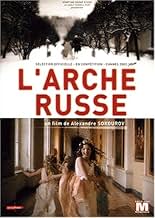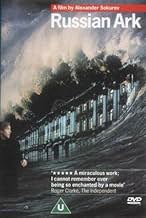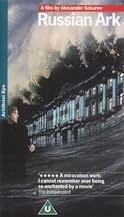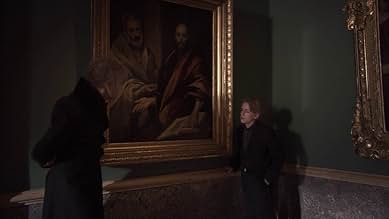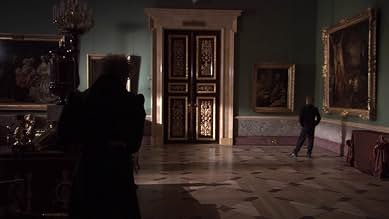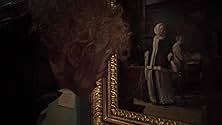A 19th century French aristocrat, notorious for his scathing memoirs about life in Russia, travels through the Russian State Hermitage Museum and encounters historical figures from the last ... Read allA 19th century French aristocrat, notorious for his scathing memoirs about life in Russia, travels through the Russian State Hermitage Museum and encounters historical figures from the last 200+ years.A 19th century French aristocrat, notorious for his scathing memoirs about life in Russia, travels through the Russian State Hermitage Museum and encounters historical figures from the last 200+ years.
- Awards
- 10 wins & 15 nominations total
Featured reviews
The film begins in the dark with the narrator (apparently Sokurov) commenting about how little he sees. "My eyes are open", he says, "and yet I see nothing". He does not know where he is but apparently has just died in an accident of some kind. Is this a movie? A play?" he asks. He receives no answer except a vision of 18th century aristocrats moving slowly into the Tsar's palace. An elegant white-haired man in a black cloak (Sergey Dreiden) suddenly appears and escorts the confused narrator into the corridors of the grand palace. "Everyone knows the present, but who can remember the past", says the stranger as they walk from one ballroom to the next, witnessing great works of art as well as ghost-like presences from Russia's past. We see works by El Greco, Rubens and Van Dyck in their awesome splendor. We run into Peter the Great thrashing a general, Catherine the Great looking for the bathroom, and Nicholas II, the last Russian Tsar hosting the Great Royal Ball of 1913, the last such formal occasion of its kind.
As we enter the Great Nicholas Hall, the opulent room is filled with thousands of aristocrats dancing the mazurka in gorgeous period costumes. A full orchestra is playing in the background and young soldiers are nattily dressed in their uniforms. How beautiful it all seems and how it appears they were destined to live forever but we all know how the nasty Bolsheviki spoiled the party. Ah yes, how green was my valley then. Sokurov said he wanted to make a whole film "in one breath" and he has succeeded in simulating the breathing process, pulling us in, then moving us out as we feel the rhythm of our own life beating with the swirl of lost humanity. At the end of Russian Ark, we see the peaceful flow of a river outside the hall to which the narrator comments, "The flow is forever. Life is forever." Having completed the past, our invisible guide is now ready to move into the endless silence that is, in the phrase of the Anglican priest Thomas Kelly, "the source of all sound".
Director Aleksandr Sokurov is the voice of the anonymous inquisitor who accompanies nineteenth century French marquis Sergei Dreiden (Sergei Dontsov) on a breathtaking tour of the physical and spiritual Hermitage of St. Petersburg. He has made a groundbreaking, stunning film. Shot from a Steadycam in one continuous over hour-and-a-half stream, the film explores the treasures of one of the world's greatest museums. Equally, "Russian Ark" rambles, without regard for chronological order, through snatches of Russian and Soviet history, each short episode a fantastical peep into a wild, rich, often terrifying but always fascinating world.
In the nineteenth century European travellers, most often men (Charles Dickens, for example) and some women (Fanny Trollope for one) visited and wrote about the two untamed civilizations that beckoned to foreigners and promised adventure and intrigue: Russia and the United States. Count Dreiden, a not atypical Frenchman of haughty self-assurance and ample means, viewed Russians as boorish and their culture a gilt-splendored front for a nearly barbarous land. His book would not have been picked up by a publisher linked to the travel industry.
In "Russian Ark" Dreiden is more muted than he is in print but his unquestioning cynicism comes through as Sokurov captures the imagined journey in one building of a French nobleman through both his time and a future he questions without developing much understanding.
So we have both an Acoustaguide tour of a wonderful palace of culture and myriad treasures and snapshots of everyone from Catherine the Great to Nicholas and Alexandra and their children, including an adorable Anastasia, fated to be one of history's silly mysteries. Noblemen and contemporary sailors, bemedaled officers and bejeweled women, a cultured woman gallery guide and apparatchiks - they all fleet through and interact with the questioning but stolidly biased Frenchman.
How did Sokurov pull off a continuous take through over 4,200 feet of the Hermitage with a cast of many hundreds, gorgeously costumed, without a hitch? Unbelievable! That feat alone propels him into the Cinema Pantheon of Fame. At times I felt like I was drawn into the crowd, especially when they depart a dance to head for a fabulous banquet (the dance band is conducted by Valery Gergiev, the only famous - to Westerners - person in the film). And even though I knew from reviews that Sokurov pulled it off, I kept waiting for the seemingly inevitable "Cut!" following a miscue or stumble.
The hint of intrigue and menace that is so much part of Russia's past and present lurks behind an almost impressionistic front with scenes of one-dimensional gaiety almost but not entirely hiding a complex society. Sokurov teaches and teases simultaneously.
As visual splendor and directorial innovation this is one of the great films of our time. I look forward to owning it on DVD knowing that its magic can never be realized fully outside a theater.
Don't miss this one and see it more than once.
10/10.
It would have been enough that the director got extensive access to the Hermitage Museum in Petersburg to show it to us.
It would have been enough to have authentic costumes, choreography, and make-up for several centuries of Russian history. (I was reminded that my husband's grandmother was a young seamstress for rich folks like these, making this extravagant lifestyle possible.)
It would have been enough to have literally a cast of thousands because how else can one really know how those fantastic ballrooms and grand staircases were meant to be used and seen without a full orchestra and gowned and uniformed participants as far as the camera can see?
It would have been enough to come up with a cute gimmick of a time-traveling two-some to glide us through the rooms of the Hermitage to show the tsars, aristocrats, curators, and ordinary Russian tourists who have passed through over the years, with humorous commentary on Russia's changing relationship with Europe over these centuries as shown through the art and architecture of the building while wars and revolutions loomed outside.
But then, it would have been enough that it's all done in a single take over just an hour and a half with luscious cinematography.
There was a slow line to get in the theater so I missed the opening historical background, and I've learned most of my Russian (let alone European) history from novels and movies so I did get a bit lost here and there wandering the corridors of history, but the unseen narrator posits that this is all a dreamscape anyway.
I made a point of seeing this because a fellow cinephile who I frequently bump into at my local arthouse had directly called the distributor asking when it would be playing elsewhere and was told they can't afford to make more prints available so one can only see it at the Manhattan theaters -- so make a point to see it on a movie screen and not just wait for when the History Channel shows a reduced version.
The film was obviously shot in one day, but the cast and crew rehearsed for months to time their movements precisely with the flow of the camera while capturing the complex narrative, with elaborate costumes from different periods, and several trips out to the exterior of the museum. Tillman Buttner, the director of photography, was responsible for capturing it all in one single Steadicam shot. "Russian Ark" is an amazing accomplishment, and clearly made with passion, but while the film is sure to be hailed as a masterpiece by some, its narrative conceit isn't nearly as interesting as the technical feat of its creation. The result is a unique and intelligent film with sporadic moments of transcendent beauty that fails to create a strong emotional connection with its audience. It's essentially a 96-minute museum tour, with the added benefit of time travel and wax figures that briefly come to life.
But wax figures are all they are, essentially. Sokurov, as though following a hasty guide, spends so little time with the historical figures he portrays that it often feels as though he's moving on just as you begin to figure out who and what you're watching. The Russian experience of World War II, for example, is portrayed with a brief stop in a foreboding, ghostly room filled with coffins. The filmmaker is known for his lugubrious pacing, but Russian Ark has the odd distinction of seeming both slow paced and rushed. It moves slowly and mournfully, but still only glances across the surface of the eras it portrays. It's a demanding film, encompassing a wealth of Russian history and art history between its first and final frames. Those who stay with it will be rewarded in the end by a gorgeously mounted ball, in which the camera gracefully slides among elaborately costumed dancers as the orchestra plays. It's a deeply felt irony that this transcendent moment of joy takes place on the eve of the Russian revolution, and the world of these briefly glimpsed characters is about to come crashing to an end. It's a shame that the film has few moments where form and content align so powerfully
Did you know
- TriviaShot in a single take. The first three attempts were cut short by technical difficulties, but the fourth was successful.
- GoofsMany extras look to the camera and they quickly return to a default mark.
- Quotes
The Time Traveller: Sir. Sir. A pity you're not here with me. You would understand everything. Look. The sea is all around. And we are destined to sail forever, to live forever.
- ConnectionsEdited into Spisok korabley (2008)
- SoundtracksMazurka
(from opera "A Life For The Tsar")
Music by Mikhail Glinka
Performed by Mariinsky Theatre Orchestra
Conducted by Valery Gergiev
- How long is Russian Ark?Powered by Alexa
Details
- Release date
- Countries of origin
- Languages
- Also known as
- Russian Ark
- Filming locations
- Production companies
- See more company credits at IMDbPro
Box office
- Gross US & Canada
- $3,048,997
- Opening weekend US & Canada
- $29,022
- Dec 15, 2002
- Gross worldwide
- $8,691,860
- Runtime1 hour 39 minutes
- Color
- Sound mix
- Aspect ratio
- 1.78 : 1
Contribute to this page








